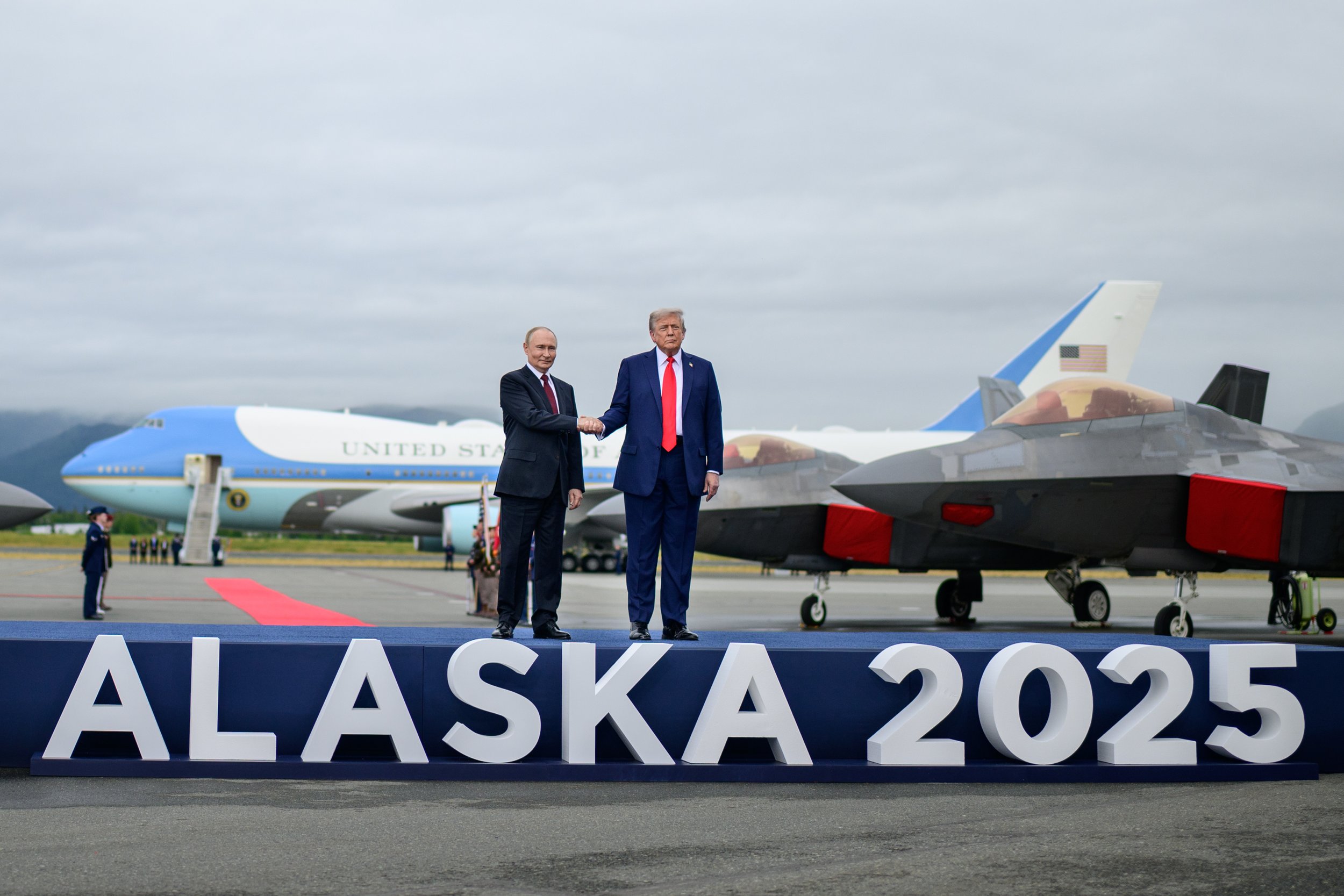Lessons From the Fog of War: Strategic Advice for President Putin's Negotiations with Trump
President Trump and President Putin on 15 August 2025 in Anchorage, Alaska.
As Russian President Vladimir Putin meets U.S. President Donald Trump in Anchorage, Alaska, on August 15, 2025, for a historic summit aimed at ending the Ukraine war, the stakes could not be higher. With Putin arriving amid a dramatic flyover by U.S. military jets and the two leaders sharing a ride in Trump's limousine, "The Beast," the talks indicate a possible thaw after years of tension. Putin, accompanied by Foreign Minister Sergey Lavrov and aide Yury Ushakov, faces an opportunity to promote Russian interests while managing economic sanctions and battlefield realities.
Drawing from Robert McNamara's "The Fog of War"—reflections on Vietnam, the Cuban Missile Crisis, and World War II—these eleven lessons offer Putin insights for effective diplomacy. Adapted here, they highlight empathy, adaptability, and moral judgment in pursuing Russia's goals.
NUMBER ONE: Empathize with Your Enemy: McNamara emphasized understanding adversaries to prevent escalation, as in the Cuban Missile Crisis where understanding U.S. fears helped de-escalate the situation. For Putin, this means recognizing Trump's domestic pressures, such as U.S. public fatigue with Ukraine aid. Advice: Acknowledge America's economic burdens during negotiations, framing concessions like Ukrainian neutrality as wins for U.S. stability. This could soften Trump's threats of tariffs on Russian trade allies, promoting mutual understanding.
NUMBER TWO: Rationality Will Not Save Us: Rational plans often stumble because of unpredictability and emotion; McNamara emphasized luck's importance in avoiding nuclear war. With ongoing strikes in Ukraine, missteps could derail the summit. Advice: Prepare for Trump's impulsive style by adding buffers, like proposing phased ceasefires monitored by neutral parties. Use backchannels with aides like Lavrov to clarify uncertainties, avoiding heavy reliance solely on logical arguments.
NUMBER THREE: There’s Something Beyond One’s Self: The duty to a larger cause—Russia's security and historical legacy—should guide decisions, as McNamara's WWII reflections demonstrated. Putin has depicted the Ukraine conflict as a fight to defend Russian sovereignty. Advice: Focus on long-term national interests rather than personal pride. If Trump offers sanctions relief, accept it as a step toward Russia's economic recovery, even if it means territorial compromises, to promote greater stability.
NUMBER FOUR: Maximize Efficiency: McNamara optimized WWII operations through data; efficiency in diplomacy involves targeting high-yield outcomes. Russia's economy is strained under sanctions, with oil prices declining amid summit speculation. Advice: Focus demands on core issues like NATO non-expansion and Crimea recognition. Use Russia's energy leverage by proposing deals that support global markets, while minimizing concessions on less critical fronts to achieve quick, effective gains.
NUMBER FIVE: Proportionality Should Be a Guideline in War: Excessive actions provoke backlash, as McNamara's regrets about disproportionate bombing illustrate. Russia's military operations in Ukraine have faced international condemnation. Advice: Respond to U.S. proposals proportionally—consider de-escalation if Trump agrees to gradually lift sanctions. This approach helps avoid alienating potential allies and positions Russia as a reasonable actor, possibly reducing global isolation.
NUMBER SIX: Get the Data: Accurate intelligence prevents errors, as Vietnam's data gaps taught McNamara. Putin must evaluate U.S. commitments amid changing battlefield intel. Advice: Demand verifiable data in agreements, such as satellite-monitored troop withdrawals. Cross-check U.S. claims with Russian intelligence to combat disinformation, ensuring decisions are based on facts rather than assumptions.
NUMBER SEVEN: Belief and Seeing Are Both Often Wrong: Perceptions can be misleading, similar to the Gulf of Tonkin incident. Putin's perspective on Western aggression might conflict with Trump's "America First" rhetoric. Advice: Question internal narratives; directly discuss Trump's true red lines to better understand them. Use the summit's expanded format—with aides present—to verify signals and avoid acting on inaccurate interpretations of U.S. intentions.
NUMBER EIGHT: Be Prepared to Reexamine Your Reasoning: Stubbornness prolonged Vietnam, McNamara learned. As the war's dynamics change, Putin must adapt if his initial positions weaken. Advice: Set flexible milestones, like a 10-day ceasefire trial, and review strategies if goals are not met. If Trump pushes for Ukraine's demilitarization, respond with revised proposals, showing a willingness to evolve for a lasting deal.
NUMBER NINE: In Order to Do Good, You May Have to Engage in Evil: Moral trade-offs are unavoidable; McNamara wrestled with war's necessities. Negotiating with Trump involves compromising on ideals for practical benefits. Advice: Be willing to accept short-term concessions, like halting offensives, to achieve long-term gains such as sanctions relief. View this as strategic pragmatism, balancing ethical costs against Russia's broader security and economic interests.
NUMBER 10: Never Say Never: Absolutes overlook the fluidity of war, as McNamara observed during crises. Putin's firm stances on territory could restrict options when unexpected U.S. offers arise. Advice: Avoid rigid ultimatums; instead, suggest open-ended frameworks for NATO guarantees. Be prepared for surprises, such as Trump's energy deals, by having alternatives ready to prevent Russia from being locked into unworkable positions.
NUMBER 11: You Can’t Change Human Nature: Human flaws like fear and ambition persist, driving conflicts as McNamara observed. Trump's ego and Putin's resolve reflect this. Advice: Recognize egos by allowing Trump "wins" in rhetoric while ensuring Russian priorities are met. Invest in post-summit mechanisms, like joint commissions, to reduce frailties and avoid future breakdowns.
CONCLUSION: McNamara's lessons shed light on the complexities of diplomacy, encouraging humility and strategic foresight. For Putin, applying these lessons in Anchorage could lead to a peace that strengthens Russia's position, shifting resources from conflict to renewal. Success relies on balancing resolve with flexibility, transforming rivalry into a stable equilibrium.
SOURCES:
McNamara, R. S., & VanDeMark, B. (2003). In retrospect: The tragedy and lessons of Vietnam. New York, NY: Vintage Books.
Morris, E. (Director). (2003). The Fog of War: Eleven Lessons from the Life of Robert S. McNamara [Documentary]. United States: Sony Pictures Classics.

